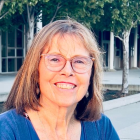Support strong Canadian climate journalism for 2025
Madeline Carr is the produce manager at Fredericton’s Market Greens, a not-for-profit providing fresh produce and plant-based nutrition resources at very low prices.
This 22-year-old New Brunswick resident also volunteers with Ocean Bridge-Ocean Wise, supporting young people to lead marine conservation projects and boost sustainable fishing. In 2021, she was named one of Starfish Canada’s Top 25 Environmentalists under 25.
This piece is part of a series of profiles highlighting young people across the country who are addressing the climate crisis. These extraordinary humans give me hope. I write these stories to pay it forward.

Tell us about Market Greens.
Every week, 70 to 75 mostly low-income shoppers buy fresh produce offered at wholesale prices from us at a space we borrow from the Fredericton Public Library. I ensure people get what they selected and are supported to prepare and enjoy the food.
If people have diet-related health issues, the food is free for 15 weeks. Some physicians even refer their patients to us. We offer friendly interactions, information and good recipes so people can learn to enjoy a plant-based diet.
What are some of your responsibilities?
I let our customers know what food is available and help them make their selections either online or with a volunteer phone call. I then buy the produce we need to minimize waste and ensure we have volunteers ready to sort and prepare the orders for pickup. We also have open shopping, so I ensure there are enough volunteer cashiers and helpers. We provide information to build an understanding of the health benefits of plant-based diets and on the storage and preparation of fruit and vegetables for maximum nutrition.
What impacts have you seen?
In 2021, 70 per cent of our shoppers increased their intake of fruits and vegetables and half said they were cutting down on highly processed foods. Almost 80 per cent said they had benefited from the education material and recipes we give out.
These numbers matter, but what keeps me going are the changes to the people. For example, when one quite elderly customer started coming last year, at first she was very subdued and obviously not very happy. She took full advantage of our 15-week free food program and our volunteers spent time with her explaining the educational materials and recipes. Just a few months later, she returns every week and is obviously so much better. She has lost 80 pounds, is always smiling and has more self-confidence and tells our volunteers she is “better in my mind.” It is clear to me that she was lonely and her visits to us were an important social outing. Plus, our volunteers really feel good when they see the difference.

Tell us about your work at Ocean Bridge-Ocean Wise.
My project was to organize and host a two-day beach cleanup at a nearby island owned by the Nature Trust in the Bay of Fundy. We had 30 volunteers, including 15 teenagers, who stayed overnight. It was so much fun and we cleaned up a lot of trash.
How did you end up in this work?
I was raised in the country with a strong work ethic and appreciation of the nature around me. In high school, I was on my student council and editor of the school yearbook, but the most fun was competing with my school to solve environmental problems in the Envirothon. We placed third in the international public speaking component, beating out 500,000 other students around the world.
That was a great feeling, but I didn’t really make the connection between the importance of food security and plant-based diets until I learned about this at university. Now I want to do more to help others make the connection between their own health and planetary health.

What makes your work hard?
Like so many of my friends, I suffer from eco-anxiety made worse by feeling we are not doing enough even though we all push ourselves. It is tough to be working so hard and continue to see the beautiful forests around us and other places we love continue to be destroyed.
What gives you hope?
I remind myself that I do what I can and I will do more tomorrow, and to spend time in the places I love and with the people I love. I see the small results in the people we serve and know I made a difference for them. Low-income people are not thinking about climate change. They are thinking about their own survival. It makes me glad when one of our customers connects the dots between their own improved health and that of our planet.

What would you like to say to other young people?
Be persistent. I sent out 30 applications for scholarships and only got one, but it was enough. Find out what makes you passionate and work in that space. Making the most money is not going to be a recipe for happiness. You can make what you need and more and take care of the planet and your health at the same time if you understand the importance of community.
What would you like to say to older readers?
Be the pathway for the young person in your circle to take the next step.






Comments